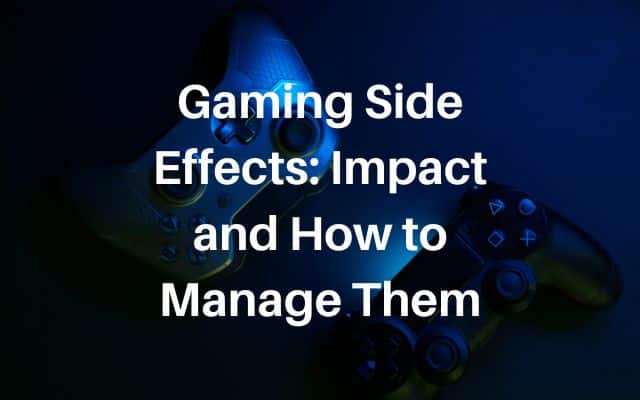Gaming Side Effects: Understanding the Impact and How to Manage Them

Understanding the potential gaming side effects is crucial for maintaining a healthy and balanced gaming experience. Gaming has become a popular form of entertainment and a widely adopted hobby for people of all ages. While gaming offers numerous benefits, it’s important to be aware of the potential side effects it can have on individuals. Here are various side effects of gaming and discuss ways to mitigate their impact.
Impact of Gaming Side Effects
Physical Health Effects:
a. Sedentary Lifestyle: Extended periods of gaming can lead to a sedentary lifestyle, resulting in weight gain, obesity, and related health issues.
b. Musculoskeletal Problems: Repetitive motions and poor posture during gaming sessions can lead to musculoskeletal problems like neck and back pain, wrist strain, and carpal tunnel syndrome.
c. Vision Problems: Constant exposure to screens can cause eye strain, dry eyes, blurred vision, and other visual discomforts.
Psychological and Emotional Effects:
a. Addiction: Gaming addiction, also known as gaming disorder, can lead to excessive and compulsive gaming behavior, causing social and academic problems, mood swings, and difficulty in controlling gaming habits.
b. Poor Academic Performance: Excessive gaming can negatively impact academic performance, as it can consume valuable study time and affect concentration and motivation.
c. Social Isolation: Spending excessive time gaming can lead to social isolation, with individuals neglecting real-life relationships and interactions.
d. Sleep Disturbances: Gaming late into the night can disrupt sleep patterns, leading to sleep deprivation, insomnia, and daytime fatigue.
Behavioral and Cognitive Effects:
a. Aggression and Violence: Excessive exposure to violent or aggressive gaming content has been associated with increased aggressive thoughts, behavior, and desensitization to violence.
b. Impaired Social Skills: Excessive gaming can hinder the development of effective social skills, resulting in difficulties in face-to-face interactions and forming meaningful relationships.
c. Impaired Cognitive Function: Spending excessive time gaming may negatively affect cognitive functions such as attention span, problem-solving abilities, memory, and impulse control.
How to Manage the Gaming Side Effects:
Set Time Limits: Establish healthy gaming habits by setting limits on the amount of time spent gaming each day or week.
Take Breaks and Exercise: Take regular breaks during gaming sessions to stretch, move around, and engage in physical activities or exercise.
Maintain Proper Posture and Ergonomics: Sit in a comfortable and ergonomic position while gaming to minimize the risk of musculoskeletal issues.
Optimize Gaming Environment: Ensure proper lighting, use screen filters or blue light glasses to reduce eye strain, and maintain a comfortable room temperature.
Balance Gaming with Other Activities: Encourage a balanced lifestyle by engaging in other hobbies, socializing, pursuing physical activities, and focusing on academics or work.
Seek Support if Needed: If gaming addiction or related issues become a significant concern, seek professional help or support groups specialized in gaming addiction.
FAQ
Q: What are the potential side effects of gaming?
A: Some potential side effects of gaming include a sedentary lifestyle, musculoskeletal problems, vision issues, addiction, poor academic performance, social isolation, sleep disturbances, aggression, impaired social skills, and impaired cognitive function.
Q: Can gaming lead to physical health problems?
A: Yes, extended periods of gaming can contribute to a sedentary lifestyle, leading to weight gain, obesity, and related health issues. It can also cause musculoskeletal problems, such as neck and back pain, wrist strain, and carpal tunnel syndrome.
Q: Are there psychological and emotional effects associated with gaming?
A: Excessive gaming can lead to addiction, which can result in social and academic problems, mood swings, and difficulty controlling gaming habits. It may also lead to poor academic performance, social isolation, and sleep disturbances.
Q: Can gaming impact behavior and cognitive function?
A: Yes, excessive exposure to violent or aggressive gaming content has been associated with increased aggression and desensitization to violence. It can also hinder the development of social skills and impair cognitive functions like attention span, problem-solving abilities, memory, and impulse control.
Q: How can I mitigate the side effects of gaming?
A: Some ways to mitigate the side effects of gaming include setting time limits, taking breaks and exercising, maintaining proper posture and ergonomics, optimizing the gaming environment, balancing gaming with other activities, and seeking support if needed.
Q: Is gaming addiction a real concern?
A: Yes, gaming addiction, also known as gaming disorder, is a recognized condition characterized by excessive and compulsive gaming behavior that can have negative impacts on various aspects of life.
- How to use G-Sync for a smooth gaming experience
- AS Gaming vs B2K: Who has better Free Fire MAX stats in 2023?
- Android Gaming: Tips, Tricks, and the Best Games for Your Smartphone or Tablet
- 10 Most Popular Online Games in iGaming Industry 2022
Conclusion:
Even while playing video games can be a fun and engrossing hobby, it’s important to be aware of the possible negative impacts it may have on behavior, psychological health, and physical health. By understanding and taking measures to mitigate gaming side effects, individuals can maintain a healthy and balanced relationship with gaming, ensuring a positive overall experience.







